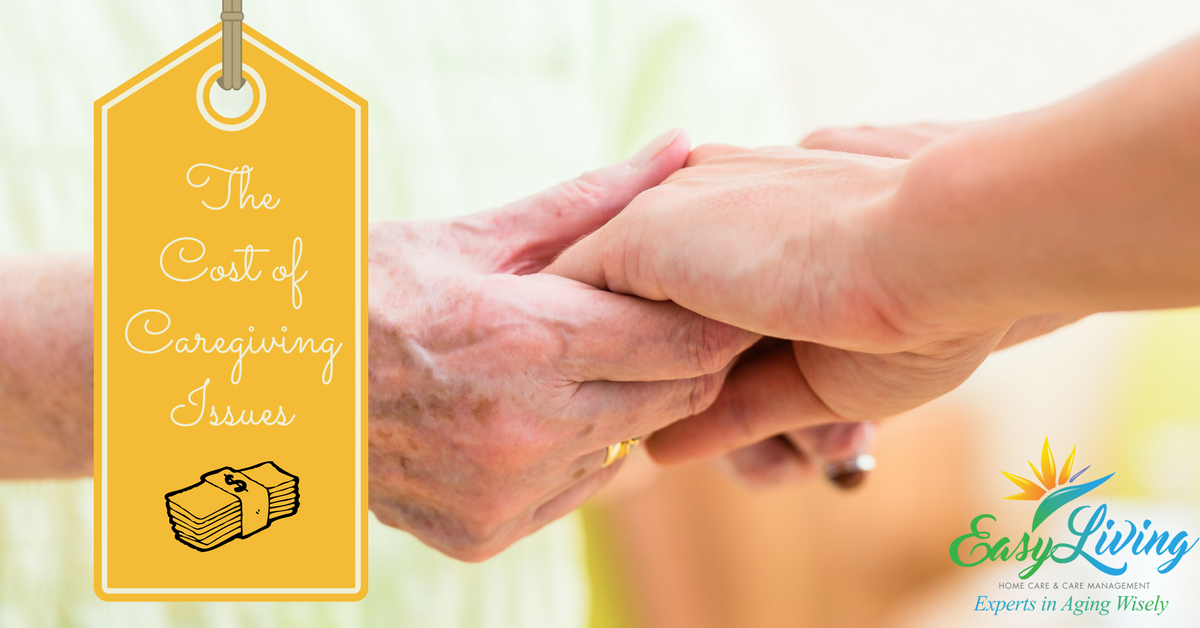The Value of Caregiving
Family caregivers provide $470 billion worth of care each year (AARP Public Policy Institute. Valuing the Invaluable: 2015 Update.). That’s more than 40 million caregivers providing unpaid services worth more than the entire annual Medicaid budget. So, clearly our elders and our society benefits from family caregiving. Don’t ever let anyone tell you that “families just don’t care for their elderly parents anymore”. Our system would be completely broken, and broke, if not for the valuable contributions of families.
Caregiving Costs: Expenses and Opportunity Costs
However, we can’t forget that caregiving comes at a big cost to families. Caregivers are spending an average of $6,954 out-of-pocket on caregiving costs (AARP, 2016). This is about 20% of their income, but for low-income families and Latino families the impact rises to about 44% of their total income. Dementia caregivers reported out-of-pocket caregiving costs of $10,697. Long-distance family caregivers had the highest caregiving costs at $11,923.
But, out-of-pocket direct costs only show a tiny part of the picture. Opportunity costs play a much larger role. Family caregivers frequently have to leave their jobs, reduce their hours, turn down promotions, miss work time, or retire early. According to a Gallup poll, the majority of family caregivers report that their role has negatively impacted their career. MetLife found that the average caregiver’s lost wages are $143,000.
Lost wages and career opportunity costs carry over to lost pension and Social Security benefits. MetLife’s study of working caregivers estimated the cost impact of caregiving for a female caregiver (wages, SS, pension) averages $324,044. The average cost impact for male and female caregivers (50+, caring for a parent) is $303,880.
Emotional and Physical Costs
Caregiving stress can affect relationships, health and wellbeing. Caregivers are less likely to engage in preventative health behaviors. Studies consistently report higher levels of depressive symptoms and mental health problems among caregivers. Caregivers drink and use other substances at higher levels. They also suffer from increased rates of physical ailments, increased tendency to develop serious illness, and have high levels of obesity and bodily pain. Beyond the cost to your wellbeing, these caregiving issues can lead to higher healthcare costs, lost wages and more.
The Good News
While this sounds like a lot of bad news for caregivers, caregiving can also be a rewarding experience. Benefits include personal growth and strengthened relationships with care recipients. The costs, both actual and personal, can largely be reduced with the right plan and help. Here’s a strategy to reap the benefits while cutting the costs.
Plan ahead, and talk about it.
Avoiding the conversations doesn’t prevent reality. But, it does prevent good planning which can drastically reduce costs. Crises will cost you. Click Here to download our free caregiver checklist and take these steps now:
- Consult with a geriatric care manager.
- Review the legal situation with an attorney. Execute advanced care planning documents. But, don’t just sign documents and forget about it. Talk about values, wishes and how you want them carried out. Set up a family meeting (your attorney and care manager can help).
- Evaluate your financial situation. Hopefully, your parent has a good financial advisor who helps not only with investments but with planning for long-term care costs. Now’s the time to get a better understanding of all the coverage and assets your parent has, and how you might pay for support services. With a good understanding of your financial situation, a care manager can help put the pieces together for you.
Start planning, start saving: set up a consultation.
Take opportunity costs into account when making care/financial decisions.
Too often families only look at the hard costs. For example, it will cost X$/month to live at this ALF or to hire a professional caregiver. But, as the information above shows, “free” family care comes with a cost too. Can you minimize your lost work time or damage to your business by “outsourcing” some care tasks?
Some paid services may prevent higher care needs (and costs) in the future. Studies have shown that personal care in the home prevents or delays nursing home placement. Some sample state programs have produced millions in savings. Families commonly come to us when they realize their parent is having difficulty managing the home. Often all it takes to stay safely at home is some help with housekeeping, errands, and healthy meal prep. Give us a call at 727-447-5845 to find out how our trained caregivers can help your family.
Similarly, hiring professionals to get quality advice might cost you in the short term. However, in addition to the time and hassle saved, your actual long-term savings more than makes up for the expense.
Get help accessing benefits.
Before you dip into your savings to pay for a parent’s care, talk to an expert. Is your parent eligible for VA benefits, Medicaid, or other community services? You often get different answers when navigating the complex puzzle. You might research a benefit program and think your parent is ineligible. But, we can’t tell you the number of times we’ve found that’s not the case. Or, our care managers were able to find another program or option. An advocate helps you bring together the fragmented system and find the right solutions for you.
Those initial planning meetings with your professional advisors can give you a solid foundation. Too often, families assume Medicare covers things it does not. Or, they don’t realize that waiting lists exist for many senior services. Knowing the reality gives you time to make wise decisions. And, at the time of need, you also know who to turn to for the best advice.
Contact Us
Talk to one of our experts to better understand your options.


